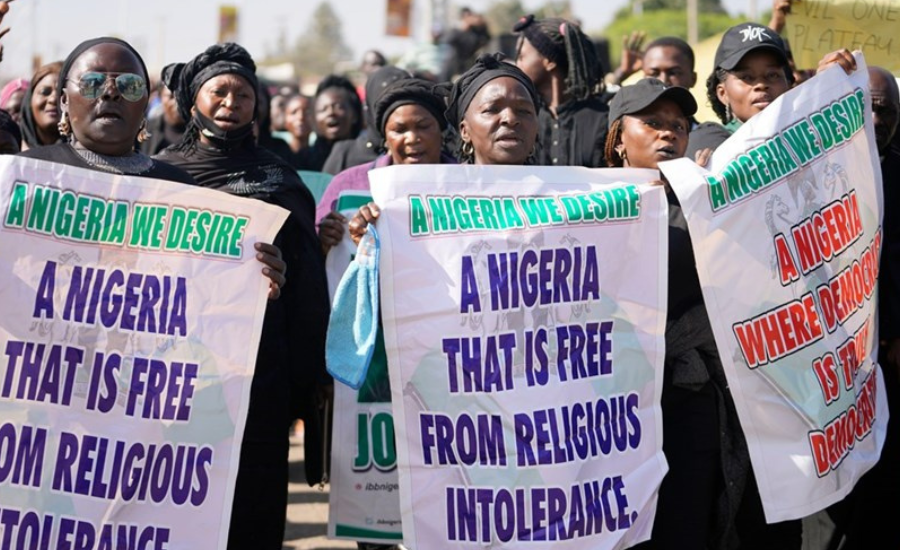Report: 380 Million Christians Face Growing Persecution Worldwide
Written By EEW Magazine Online News EditorsNigeria accounts for nearly 70% of global deaths linked to Christian persecution, according to Open Doors.(Credit: Getty via EEW Magazine)
A recent report from Open Doors International reveals a startling reality for Christians worldwide: more than 380 million believers faced significant persecution and discrimination in 2024, a staggering rise of 15 million from the previous year.
The annual “World Watch List 2025,” made public January 15, ranks the top 50 countries where Christians endure the most severe threats, violence, and legal harassment, based on data collected from October 1, 2023, to September 30, 2024.
Christians across the world are denied basic legal rights in societies hostile to their faith (Credit: Getty)
Key Points
More than 380 million Christians experienced persecution or discrimination in 2024—an increase of 15 million from the previous year, according to Open Doors International.
Nigeria remains the deadliest nation for Christians, with 3,100 of the 4,476 faith-related killings recorded worldwide. North Korea continues to rank as the most repressive country for believers.
Central Asia and Algeria saw rising violence and legal crackdowns, with new laws and state actions targeting both individual Christians and entire congregations.
Open Doors, an advocacy group founded in 1955 and now operating in 27 countries, paints a sobering picture. “Far from being given equal protection as citizens, all too often Christians across the world are denied basic legal rights in societies hostile to their faith,” the report states.
The numbers are harrowing: an estimated 4,476 Christians were killed for their faith in 2024. Nigeria alone accounted for nearly 70% of those deaths, with 3,100 Christian martyrs. Despite a slight decrease from last year’s toll, the West African nation remains the deadliest place on earth to follow Christ.
Nigeria’s violence is driven by a toxic mix of extremist groups, communal conflicts, and weak government protections. According to the International Crisis Group and Human Rights Watch, attacks on Christians in Nigeria frequently go unpunished, fueling a cycle of fear and impunity. “Though fewer Christians were killed for their faith in Nigeria compared to last year, it remains disproportionately deadly for Christians,” Open Doors notes.
Demonstrators take to the streets in January 2024 in Plateau state, Nigeria, demanding justice and protection after a wave of violent assaults on Christian communities. (Credit: Alamy)
Beyond murder, the report documents widespread imprisonment for Christians practicing their faith. In 2024, 4,744 Christians were arrested, detained without trial, or sentenced to prison. India saw a particularly sharp surge, with at least 1,629 believers detained and over 500 sentenced—part of a broader trend of rising religious nationalism and anti-conversion laws, as highlighted by Amnesty International and Human Rights Watch.
Other nations where Christians have faced harsh imprisonment include Iran, Eritrea, and Bangladesh, where government crackdowns and social hostility make open worship and faith-based community life perilous.
For nearly every year since 2002, North Korea has topped Open Doors’ list as the world’s most dangerous country for Christians.
Survivors of a gunmen attack react as Nigeria’s Vice President Kashim Shettima visits a displacement camp in Bokkos, north-central Nigeria, on Dec. 27, 2023. (AP/Sunday Alamba)
The regime’s paranoia and drive for ideological purity have only intensified. Converts discovered by authorities face execution, torture, or indefinite incarceration in labor camps, according to corroborating research by the U.S. Commission on International Religious Freedom (USCIRF) and Amnesty International. Open Doors describes a system where any perceived outside influence—especially Christian faith—is “viciously purged.”
While the suffering of Christians in places like North Korea and Nigeria is tragically familiar, the 2025 report spotlights new regions of concern. Central Asia, especially Kyrgyzstan, saw a dramatic rise in violence targeting churches. Kyrgyzstan jumped from 61st to 47th place on the list after incidents like the armed raid on St. Nicholas Catholic Church in Talas, where worshippers were detained and church leaders coerced into signing confessions of “illegal missionary activities.”
Peter Paulsson, secretary general of Open Doors International’s Swedish office, points to the tightening grip of autocratic regimes as a major driver. “There are laws in place that not only target individual Christians, but also churches, including home church movements,” Paulsson explained in an interview with OSV News. “Both groups have been attacked in different ways by the regime as well as individuals.”
Algeria, ranked 19th, has also emerged as a new frontline. According to Open Doors, “the number of Christians awaiting trial and sentencing is at an all-time high.” Algerian authorities have increasingly targeted churches with administrative closures and legal harassment, particularly against Protestant congregations and online Christian ministries. Recent research by the United States Department of State corroborates these findings, noting an “escalating crackdown” on religious minorities in Algeria.
Christians march in Abuja carrying signs calling for peace and greater security in Nigeria. (Kola Sulaimon/AFP via Getty)
Open Doors’ findings mimic broader trends identified by researchers at Freedom House and Pew Research Center. As democracy declines and authoritarianism spreads, religious minorities, including Christians, face greater risks.
The report also highlights the Philippines, a predominantly Christian country, that, while not in the top 50, now ranks among the top 78, reflecting the complex realities of religious violence even in nations with Christian majorities.
Despite the grim statistics, Open Doors continues to advocate for change. The organization urges governments, especially those that have ratified international human rights conventions, to uphold their commitments. Paulsson hopes the report will “expose” the ongoing crisis and galvanize the international community to increase pressure on offending states.
“We do a lot in this area of advocacy that we believe will help support the persecuted church in the long run,” Paulsson says.
As persecution rises, so too does the resolve of those striving to protect religious freedom. For 380 million Christians worldwide, the challenge is both urgent and ongoing.
Go Deeper:
More on EEW Magazine Online:











